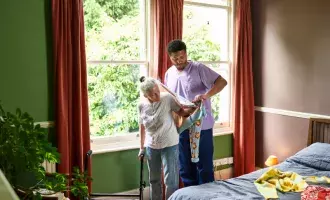In this series of Q&As, Stephen Ottewell, Director of Planning and Building Control at Capita Local Public Services, interviews planning experts on the sector’s hot topics, including the effects of the Covid-19 pandemic, the challenges and opportunities facing planning teams and what local authorities can expect in 2021.
First up is Steven Lyttle, a principal planner with more than 14 years’ experience in urban design and management of historic environments. Steven currently provides urban-design support to North Tyneside Council and has previously developed masterplans and design codes for strategic housing and mixed-use sites. He is also experienced in preparing planning policy and supplementary planning guidance for high-quality development and public spaces.
Stephen: Thank you for joining me today, Steven, and sharing your insight and expertise. Can you tell me what changes you’ve seen in masterplans and design codes over recent months, as local authorities have had to adapt to new ways of working and newly emerging requirements?
Steven: I think there’s a much greater level of awareness of the importance of good-quality design nowadays, particularly in relation to its impact on our health and wellbeing. During this pandemic and its ensuing lockdowns, the design of the places we live in has become more important than ever. Good design isn’t just about aesthetics; it’s also about how places work and make us feel. The pandemic has also highlighted the importance of providing easy access to green spaces and local amenities on people’s doorsteps.
Masterplans and design codes help to improve the quality of new developments, so that we can build popular and well-designed places. Evidence shows that sites that have been developed in accordance with design codes are consistently better quality. However, design codes haven’t really been widely used in the past and have generally only been associated with large-scale projects.
This is slowly changing now as they’re finally becoming an important part of the planning process, particularly for allocated sites. This means that local councils have very quickly needed to become much more familiar with the concept of design codes, and work out exactly how they can use them to create places that reflect local characteristics and will stand the test of time.
Stephen: So what do you see as the main challenges facing planning teams regarding masterplans and design codes now? And how can they prioritise and overcome them?
Steven: For me, the main challenge for local authorities when developing masterplans and design codes is making sure that they’re workable and effective. A masterplan should show a clear conceptual vision to guide future development, while a design code should define measurable and enforceable rules against which applications can be assessed.
The best design codes reflect local characteristics and environmental sensitivities, while ensuring that the level of detail still allows flexibility to encourage innovation. Any details in design codes that specify materials or design detailing should also consider whether they’re deliverable.
I think that, to be successful, planning professionals must ensure that there’s meaningful local community engagement and collaboration with developers and landowners. Masterplans and design codes are only as effective as the consensus that’s built around them; therefore, combined-partnership working is critical to achieving success.
Stephen: I absolutely agree that citizens’ participation in development schemes is crucial. Can you tell me what new innovations you’ve seen in your area that have helped to create better outcomes for them?
Steven: Preparing masterplans and design codes benefits hugely from positive community engagement. So it’s very important that local authorities don’t treat engagement simply as a tick-box exercise. Fortunately, we’re now seeing them increasingly use new and innovative engagement tools.
I’d say that visual content is more important than ever for community engagement strategies; not just photos but computer-generated videos showing people what places could look like. To make this material as visible as possible, it’s vital to share it on social media and give local people a place to comment and contribute their own experiences.
When you use engagement tools to interact effectively with the community during the design process, you can build a shared consensus around your vision for new developments and deliver better outcomes for everyone.
Stephen: Finally, looking ahead to next year, what do you think the future looks like for design codes and masterplans? What key things do you see coming in 2021? What changes can we expect as a result of the recent Planning White Paper and how can planning teams and local authorities prepare now?
Steven: One of the key elements in the Planning White Paper is the central role envisaged in the new system for design codes. The Government wants design codes to become binding documents, against which planning applications will be judged and through which communities will be able to have their say about how developments will look.
I think that the expanded use of design codes will require local authorities to spend a significant amount of additional time developing policy. This is likely to prove challenging as many local authorities have had their funding cut and their operational capacity reduced.
There seems to be a general consensus among planning professionals that there needs to be new national investment in our planning system’s skills and capacities in order to deliver better-quality design. Where local authorities don’t currently have the skills or capacity to produce masterplans and design codes, they should use design review panels to support significant developments. These panels can provide practical advice to help to improve new schemes and add significant value to the overall development process.

Steve Ottewell
Director of Planning and Building Control, Capita Local Public Services
Steve is a chartered town planner with over 15 years’ experience across the private and public sector. Steve has worked for Capita for over 12 years in various technical and managerial positions, most recently taking on overall responsibility for all our planning teams within local government.

Steven Lyttle
Principal Planner, Capita
Steven is a Principal Planner with over 14 years of experience in urban design and management of the historic environment. He currently provides urban design support to North Tyneside Council and has previously prepared masterplans and design codes for strategic housing and mixed-use sites. Steven is also experienced in preparing planning policy and supplementary planning guidance for high quality design.







